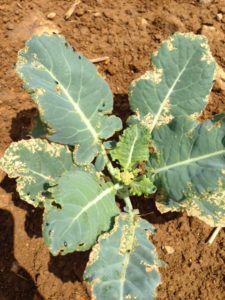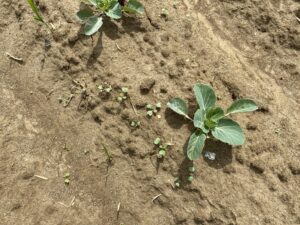Sweet Corn
There will be significant changes to insect trapping efforts in the Vegetable IPM Program for this season. At present, personnel are deploying black light and corn earworm (CEW) pheromone trap networks in central and northern New Jersey counties. In areas from central Burlington County southward, grower cooperators have been provided with CEW pheromone traps and will be monitoring these traps on their own properties and reporting catch data to IPM personnel. This is an effort to maintain a statewide reporting program for the most significant economic pest of sweet corn despite a shortage of professional staff this year. The IPM program thanks these growers in the southern counties for their assistance in maintaining this necessary service.
Black light trap derived maps for European corn borer (ECB), CEW and brown marmorated stink bug (BMSB) will not appear in the Plant and Pest Advisory, as there is no longer a statewide blacklight trap network. Data from existing black lights in the central and northern counties will appear in table format, with associated information on the relevance of the populations. Provided that data from the southern CEW pheromone traps is available on a regular basis, maps will be generated for this pest/trap type. Limited collections from traps thus far have not contained any target pests.
Cole crops
 Recently transplanted crops of broccoli, cabbage, etc. as well as newly emerged seedlings are at risk of damage from flea beetles (see photo at left). Flea beetle activity occurs primarily on warm, still days. Inspect plantings under these fair conditions to get an accurate assessment of population in the field. Flea beetles can do considerable damage to small plants, and have a
Recently transplanted crops of broccoli, cabbage, etc. as well as newly emerged seedlings are at risk of damage from flea beetles (see photo at left). Flea beetle activity occurs primarily on warm, still days. Inspect plantings under these fair conditions to get an accurate assessment of population in the field. Flea beetles can do considerable damage to small plants, and have a  preference for the “hotter” flavored crops like arugula and mustard. They will feed on all brassicas however, and broccoli and Tuscan kale are also favored hosts. Site rotation is critical to managing flea beetle populations because they can build to high numbers in the repeated presence of host crops or host weeds (see photo at right – cabbage transplants with brassica weeds). Scout early and consider treating when 50% or more plants are showing injury and flea beetles are present on plants. Respond quickly to limit injury. Systemic insecticides such as the neonicotinoid (IRAC 4A) class, used at planting, can provide protection from flea beetles for the first critical weeks. Check the Cole Crops section of the 2022/23 Commercial Vegetable Production Guide for a complete list of insecticide recommendations.
preference for the “hotter” flavored crops like arugula and mustard. They will feed on all brassicas however, and broccoli and Tuscan kale are also favored hosts. Site rotation is critical to managing flea beetle populations because they can build to high numbers in the repeated presence of host crops or host weeds (see photo at right – cabbage transplants with brassica weeds). Scout early and consider treating when 50% or more plants are showing injury and flea beetles are present on plants. Respond quickly to limit injury. Systemic insecticides such as the neonicotinoid (IRAC 4A) class, used at planting, can provide protection from flea beetles for the first critical weeks. Check the Cole Crops section of the 2022/23 Commercial Vegetable Production Guide for a complete list of insecticide recommendations.

